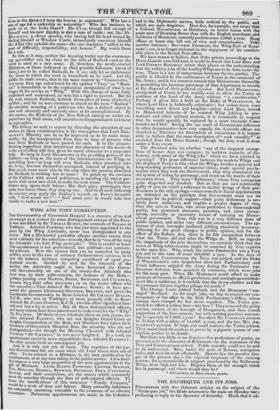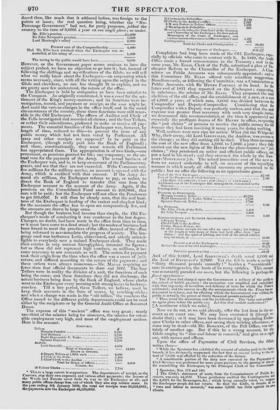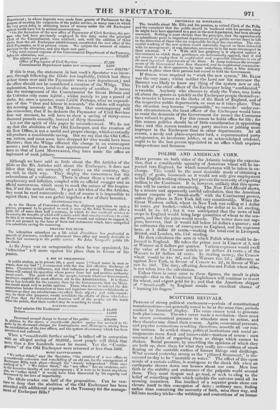THE EXCHEQUER AND ITS JOBS.
tINSATISTIED with five elaborate articles on the subject of the " Exchequer job," the Globe returned to the topic on Monday last ; professing to reply to the Spectator of Saturday. Much that it ad-
duced then, like much that it adduced before, was foreign to the points at issue ; the real question being, whether the " No- Patronage Government" had not, for party purposes, jobbed the country to the tune of 3,000/. a year on one single place ; as under.
Mr. Ellis's pension
Sir John Newport's pension Lord Monteagle's salmi
£1,400
1,000 2,000
Present cost of the Comptrollership 4,400
Had Mr. Ellis been retained when the Exchequer was re-
modelled, at his salary of 1,400 The saving to the public would have been 3,000
However, as the Government paper seems anxious to have the subject probed, we have no objection to go into it ; but, instead of following the shiftings and mystifications of the Globe, we will tell what we really know about the Exchequer,—an outpouring which seems necessary, since, with all the writing upon the subject in the Globe and elsewhere, no one has thought fit to explain, and we are pretty sure few understand, the nature of the office.
The Exchequer is held by antiquaries to have been anterior to the Conquest. As originally constituted, it was a court for the set- tlement of the King's money-matters ; and its functions were in- vestigation, record, and payment or receipt, as the case might be. And amid the various changes in the office itself, and in the social circumstances of the country, these three functions were still trace- able in the Old Exchequer. The offices of Auditor and Clerk of the Fells investigated and recorded all claims ; and the four Tellers, or rather their subordinates, professed to make or receive all pay- ments. The essential function of the Exchequer was, however, by length of time, reduced to this—to prevent the issue of any public money which had not been voted by Parliament. All taxes and other receipts are supposed* to be paid to the Exchequer, (though really paid into the Bank of England) ; and there, constitutionally, they must remain till Parliament has appropriated them. The appropriation is of two kinds,—one permanent, as pensions granted for life ; one temporary, as the an- nual vote for the payment of the Army. The actual business of the Exchequer was, and is, to keep an account of the Parliamentary grants, and see that they are not exceeded. If the Commons vote five millions for the military service, an account is opened with the Army, which is credited with that amount. If the Army de- mand six millions, the Exchequer refuses to pay, or rather, to direct the Bank of England to transfer that sum from the Exchequer account to the account of the Army. Again, if the pensions on the Consolidated Fund amount to 250,0007., that sum will be paid ; but the Exchequer will not allow the Pensioners to get 300,000/. It will thus be clearly seen, that the real busi- ness of tbe Exchequer is banking of the easiest and simplest kind ; for the accounts the office has to open are comparatively few, and the amounts are drawn'in large sums.
But though the business had become thus simple, the Old Ex- . chequer's mode of conducting it was cumbrous to the last degree. Changes, no doubt, had been made in the office from time to time, or it must have come to a dead stand ; but the modes of business had been forced to meet the practices of the office, instead of the office being reformed to accommodate the provess of society. The lan- guage used was barbarous Latin, abbreviated, and utterly unintel- ligible to everybody save a trained Exchequer clerk. They made their entries in very ancient hieroglyphics, intended for figures ; but as these did not represent high numbers, as millions, it be- came necessary to use numerals as well. The orders for payment took their origin from the time when the office was a court of judi-
cature, and differed according to the nature of the payment ; and these orders were always numerous,—Mr. MAW: requiring no
fewer than four official documents to draw out 500/. The four Tellers were in reality the division of a unit, the functions of each being the same; and these functions they did not discharge, the actual business being done by the Bank of England, whose clerks went to the Exchequer every morning with strong boxes in hackney- coaches. Till a late period, these 'Fellers, we believe, used to keep their accounts in the form of scores, by notching-sticks ; and when a change was made in the "old tallies," the vouchers the Office issued to the different public departments could not be read either by the recipients or by the General Audit Office at Somerset House.
The expense of this "ancient" office was very groat; nearly one-third of the salaries being for sinecures, the salaries for osten- sible employment very high, and most of the employment useless. Here is the account.
SINECCRYS.
Tellers, .e
Marquis Camden 2500 Earl Bathurst 2,700 Right Honourable C. Yorke 2,700 Spencer Perceval 2500
Auditor,
Lord Grenville 4,000 Total of Sinecures — 14,800
HEADS OF' °MOM
4 Deputy Tellers at 1,0001. each 4,000
1 Clek of the l'ells 1,900
1 Chief Clerk to the Auditor 1,0,0 Total for Heads of Offices — 6,600 CLERKS, Sm. 16 Tellers' Clerks 7,744 • This to a large extent is supposition. The departments of receipt, as the Customs, stop their own expenses. and various other payments ; the income of the Woods and Forests never finds its w ay to the Exchequer at all ; and znany public offices charge fees, out of which they also stop certain RUM. In the year ending 5th January 1888, the total net receipts were 50,316,0004 the payment* into the Exchequer 46,199,0004 12 Clerks in the Pens Office
23 Clerk; in the Auditor's Office 4 Mt tney-Porters in Tellers Officer
3 Meaeneers in Polls Office Messengers attending the First Lord of the Treasury and Chancellor or the Exchequer, the four patent Messengers of the Court of Exchequer, and various ancient allowances to Officers (Attila Court
Contingencies Total for Clerks and Contingencies 6,144 7,957 1,020 220 4,997 495 — 29,077 Total Expense of Exchequer £49,477
Complaints -had long been made of the OH Exchequer, espe. cially by officials who came in contact with it. In 1828, the Audit Office made a formal remonstrance to the Treasury ; and in the same year, Mr. Ews, Clerk of the Fells, submitted a plan of Ex. chequer Reform to the Chancellor of the Exchequer. A Coin. mittee on Public Accounts was subsequently appointed; and to this Committee Mr. Ews offered very excellent suggestions, Simultaneously, or following the Committee, was a Commission on Public Accounts, with Sir HENRY PARNEI.T. at its head. In the latter end of 1831 they reported on the Exchequer ; suggesting, in substance, the scheme of Mr. Ews. They proposed the total abolition of the old office, and the establishment of a new, at a cost of 4,6007. a year; of which sum, 3,000/. was divided between the
Comptroller and Deputy-Comptroller. Considering that the Comptroller with a Deputy was perfectly useless, and that the stall expense was greater than necessary with such very simple duties we denounced this recommendation at the time it appeared, f and especially the profligate dogma of Sir IlExay in office, respecting the "just claims" of persons to receive the public money for life because they had been receiving it many years, for doing nothing.
Well, matters were now ripe for action. What did the Whigs do? Why, their crony, old Lord GRENVILLE, the Auditor, was averse to the change ; so they did nothing till he died. They then increased the cost of the new office from 4,600/. to 7,000/. a year ; they fully carried out the new lights of Sir Ihmtv the place-hunter on "just claims ;" they pensioned an active' and efficient public officer, sad put a lord in his stead ; and they crowned the whole by the NEW- PORT-MONTEAGLE job. The actual immediate cost of the new re• form we cannot undertake to tell, on account of the mystifying manner in which nearly all official accounts are presented to the public ; but we offer the following as an approximate guess.
Co$t of the New Exchequer cost of the Paymoslor of C ivil Services £77:000
080 triat 014c :fa& s Mitt th's is nut cc NEw u/u1r,rj f which (lnon.) Additional cost el the Exchequer Bill management, transferred to the
UNEN0111. Treasury
COW ingenries VNRNOWN, PSNSIONS TO SINECURISTS,
Marquis Canoleu, Teller
Rigid Remould& C. Yorke, Teller
Spencer Perceval, Teller
Jun PENSIONS, Mr. Ellis. Clerk of the Pelts
Sir John Newport
SUPSRANNUATIONS AND RETIRING ALI,OWANCES, 4 Deputy Teilers.
Chief Clerk to the Auditor.
Clerks, Money-Purlers, &e.
01 au of whose receipts we can oiler no exact return; but looking at the length or time many of them had held office, their "just claims," and the spirit of jobbing, one-half of the actual salaries
may be taken, or 16,000 Dednet the cost of the Old Exehequer Present et of the Exchequers £9,107 49,7771 40,580 Probable present saving
And of this 9,0007., Lord GRENVILLE's deltIll saved 4,000/. and the Earl of BATIIURST'S 2,700/. l'et the Glcbe made a saving of " thirty thousand pounds annually ! " besides a " considerable" sum in contingencies, the basis of its many articles. This amount was constantly paraded suo more, but the following is perhaps the finest specimen- " The Times bad charged upon time Government a robbery of the public to the extent of 3,000L prccisely the occusation was amplified and embellished with that ingenuity of invention and delicacy of taste for which the Times it celebrated ; and the answer is—By the arrangements which the Times bas en- deavoured to defame, and for effecting which the Government was ratified, the public is actually the gainer of thirty thousand pounds annually " Thus stand the accusation and the justification. The 'bane and antidote' we again place before the public eye. Let him that readah understand!" [A sentiment uhicli we echo.] Now we do not, as we said already, offer the last item in the ac- count as an exact one. We may have overrated it (though we doubt that) ; or it may have been decreased by appointing Exche• quer Clerks to other offices, and saving their retiring allowance; or some may be dead—old Mr. ROBERTS, of the Pell Office, was cer• tainly of another age. But if this be a wrong account, let the Globe employ its "time and labour in research," and give us a rel one, with names and offices.
Upon the office of Paymaster of Civil Services, the Mak writes thus-
" While the Spectator has exhibited the amount of salaries paid in the latter branch, it his designedly suppressed the fact that an annual saving to the ex- tent of 7,023/. was effected by the reduction of the former. " A considerable portion of the duty now executed by the Paymaster of Civil Services was performed for some years previous to the passing of he e.gt for remodelling the Exchequer, by the Principal Clerk of the Commissar's t Spectator, Nos. 179 and 180. The Globe's statement of costs, from the Commissioners of PuhlicAc: counts, was only 44,489/. Those gentlemen omitted the Contingencies, and the 4,497/. for the Messengers, &c.; which being annually voted, we supre the Exchequer people did not return. So that the Globe, in despite. of gs "time and labour in research," was some 5,000/. too little against its mul clients.
£2,700
2,700 ^,700 8,100 1,900 1,000 2,400
Illepartment ; to whom imprests were made from grants of Parliament for the purpose of meeting the exigencies of the public service, in many cases in which the very great delay in obtaining. issues of money under the old Exchequer system would have led to serious inconvenience.
On'the formation of the new office of Paymaster of Civil Services, the per-
sons who had been previously employed in this duty under the principal Clerk of the Commissariat, were retained; and, with the addition of three clerks from the old Exchequer establishment, constituted the new office of the Civil Paymaster, as it at present exists. We subjoin the amount of salaries previous to the alteration, and also those now paid : The total annual expense of the Commissariat Department of theTreasury, before the alteration, was C10,233 The salaries now paid:
Office of Paymaster of Civil Services .C7,529 Commissariat Department Under new arrangement 3,210
— £10,739."
If this is true, the statement in last week's Spectator was incor- rect, through following the Globe too implicitly, (which had three or four times over said the Paymaster was a new department,) and the office should not be considered a creation of the Whigs. This explanation, however, involves the necessity of another. It seems that the management of the Commissariat for Great Britain and the Colonies only costs 3,210/. ; whilst merely to pay a parcel of clerks, &c. once a quarter, costs 7,529/. Perhaps, after an expendi- ture of due " time and labour in research," the Globe will explain this seeming anomaly in Whig Reform. Our contemporary will also remember, that if he deducts the Paymaster of Civil Services from our account, he will have to show a saving of thirty-seven thousand pounds annually, instead of thirty thousand.
Let not the spirit of this paper be misunderstood. We do not say that the abolition of' the Old Exchequer, and the creation of the New Office, is not a useful and proper change, which eventually will produce a considerable saving. But we say that the Old Office was rotten, and must soon have dropped let who would have been Minister; that the Whigs effected the change in an extravagant manner ; and that from the first appointment of Lord AUCKLAND down to that of Lord MONTEAGLE, they have made the office an implement of rank jobbery.




























 Previous page
Previous page